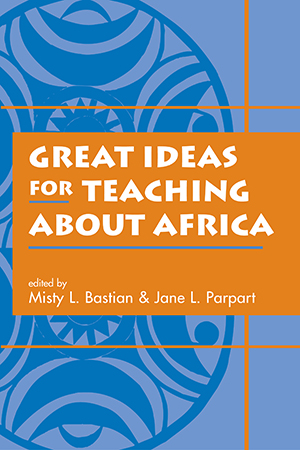Misty L. Bastian and Jane L. Parpart, editors
Choice Outstanding Academic Book!
This award-winning book presents a wealth of ideas for teaching African studies in a variety of disciplines.
The authors present a wide range of approaches: from preparing African cuisines as a way to understand people-environment relations, to using the Internet to develop a virtual art history exhibit; from viewing an African film or assigning a novel to broaden students' grasp of social contexts, to challenging students to draft their own development projects in order to better appreciate village-level society and economy. Six chapters are devoted to ways of handling such particularly sensitive subjects as ethnicity in Africa, the slave trade, AIDS, and female genital mutilation.
Each chapter includes topics that enlivened class discussion and a list of the supplementary readings that were assigned.
Misty L. Bastian is assistant professor of anthropology at Franklin and Marshall College. Her research interests focus on gender and popular media in Africa, as well as new African diasporas and global popular cultures. Jane L. Parpart is visiting research fellow at the Gender Institute and Development Studies Institute, London School of Economics. Her most recent book is The “Man” Question in International Relations, coedited with Mary Zalewski, and she has written extensively on women, gender, and development in Africa.
"This book certainly does contain some of the ‘great ideas' that its title claims, and is likely to be of value to all those who teach on Africa in universities."—Simon McGrath, The Journal of Modern African Studies
"As the title promises, this book is full of great ideas for teaching about Africa."—Gretchen Bauer, African Studies Quarterly
"This is a fine idea well executed.... Both from the perspective of practical application and from that of getting a broad sense of the state of teaching about Africa ... [the book] is inspiring and invigorating."—Kirk A. Hoppe, The International Journal of African Historical Studies
"An invaluable resource for historians, political scientists, anthropologists, black studies professors, and others who wish to include the African continent in their teaching.... The 19 chapters make a surprisingly unified, coherent, and sequential volume that will provide even experienced Africanists with a cornucopia if ideas to enrich their classroom instruction."—Choice








